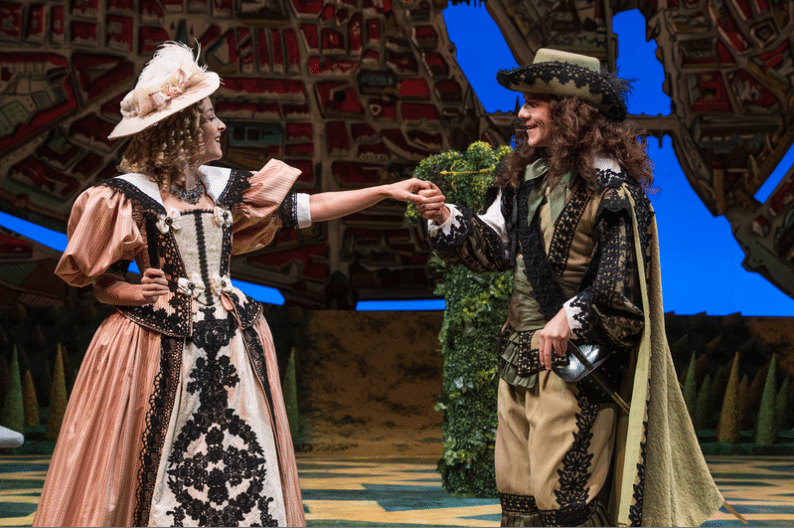CEDAR CITY — The Utah Shakespeare Festival’s new fall production, The Liar, is so inherently flawed that I cannot imagine a worthwhile production of this play even being possible. Not only is this play not worth the drive to Cedar City, it is not worth producing at all.

The Liar, adapted by David Ives from a 17th century play of the same name by Pierre Corneille, tells the story of Dorante, a young man newly arrived in Paris. Dorante’s most prevalent character trait is that he always lies. However, he has hired a servant named Cliton, who is completely incapable of lying. Dorante seeks love, but his incessant lying hampers his efforts, as do a meddling parent and a few cases of mistaken identity.
Given the synopsis, the plot has the potential for a great deal of humor. However, the script is knee-capped by Ives’s decision to write almost the entire play in rhyming verse. Within the first two minutes, it is apparent that this is a catastrophic mistake. The poetry is the quality one would expect from a tenth grader with a rhyming dictionary. Words were often chosen solely for the rhyme, like Dorante referring to his “inner elf” solely because the phrase rhymes with “self.” Other cringe-worthy rhymes include “sexy” and “apoplexy,” “enthrallment” and “emolument,” and “gazette” and “buzz-ette.” The low point was when Dorante said, “You may be a bivalve, but you’re my valve.” (Dorante had just referred to his love interest as a mollusk with a pearl inside it, not that the context does anything to improve the awkwardness of the line.)

The script is sometimes so desperate for a rhyme that it often has characters use non sequiturs—like spontaneously mentioning Polonius, solely because the name rhymes with “felonious.” Moreover, a large proportion of Ives’s poetry consists of slant rhymes. But no matter how hard the actors try to make the language work, it is just a fact that “Pont Neuf” does not rhyme with “enough,” nor does “jocular” rhyme with “interlocutor.” While occasionally a rhyme would be mildly amusing, this success-to-failure ratio is far too low, and the few laughs that come from Ives’s rhymes do not justify these crimes against literature.
Helming this production is director Brad Carroll, who often had his actors play up the rhymes’ silliness for laughs. While this is a better option than playing the script straight, there is a very short roster of techniques available to pull humor out of the script. As a result, Carroll was forced to reuse the same few techniques (e.g., mugging to the audience) so often that they lost their effectiveness quickly. Carroll also failed to establish a coherent directorial vision for the play. The script contains some modern language and references, and Carroll also mixed modern and Renaissance time periods. However, the two eras never gelled together, and I could not figure out why modern bits (like the instrumental arrangements of sitcom theme songs between scenes) were injected into a production that was overwhelmingly neoclassical in direction and design.

From beginning to end, I was embarrassed for the actors in The Liar who were charged with speaking the atrocious dialogue. Talented as they are (as most demonstrate in the Festival’s concurrently playing stellar production of Othello), the dialogue made it impossible for any actor to create an emotionally real character. The non-sensical language and actions made it impossible to believe that the characters on stage had any real existence or value, with the peak of inexplicability reached with a duel that degenerates into an imaginary fight with invisible light sabers. (I can’t believe I actually wrote that sentence in a play review.)
Still, the actors’ efforts to save Ives’s script from its own incompetence deserve mention. Jeb Burris as Dorante was a suitable “lying genius,” and his physicality when he told an elaborate story—such as his character’s supposed marriage—showed how much Dorante enjoyed weaving a complex lie. Wayne T. Carr‘s Alcippe was a welcomed dose of sobriety in the play, and his rant in his second scene was the one of the few hints of actual depth of performance in the play. Aidaa Peerzada and Betsy Mugavero were two bright spots in the cast, and both gave dignified performances, showing their characters to be more rational than the men who were wooing them. On the other hand, Brandon Burk was bland as the servant Cliton, but—again—I blame the script for making Cliton an undistinguished secondary character without the wit and humor that most stock servant characters have in plays like this.
Visually, the play was thoroughly neoclassical. Jason Lajka‘s beautiful set featured a Renaissance-era map of Paris that served as a pleasing reminder of the play’s origin and setting. David Kay Mickelsen‘s costumes were perfectly faithful to the period and a nice bit of eye candy during the play. If there was a fault in the technical designs, it was that they had none of the hints of modernity that the script and directing had.
Hobbled by a script that takes a gimmick too far, The Liar is a painful experience. I find little worth commending in this play, and I cannot in good conscience recommend it to readers. And that’s the truth.
[box]The Utah Shakespeare Festival production of The Liar plays various dates at 2 PM or 8 PM through October 13 at the Randall L. Jones Theatre on the campus of Southern Utah University. Tickets are $32-75. For more information, visit www.bard.org.[/box]
